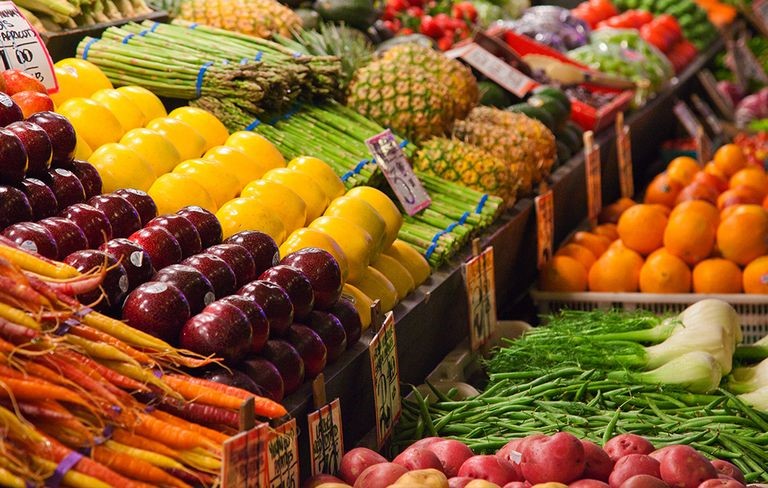All fruit is healthy, but which reign supreme?
By Markham Heid
In many ways, asking which fruit is healthiest is sort of like asking which exercises is best; the answer changes based on the benefit you’re after.
“Depending on what characteristics a person is looking for in a fruit—whether it is a higher fiber content, more vitamins like vitamin C, or more minerals like potassium—one fruit might be nutritionally superior to another,” says Lisa McAnulty, PhD, a professor of nutrition at Appalachian State University.
For example, guava is champ when it comes to potassium (688 mg per cup), while raspberries run away from the competition when it comes to fiber (8 grams per cup), according to USDA nutrition estimates.
These are the healthiest fresh fruit sources for different vitamins and nutrients, according to the USDA:
- Fiber: Raspberries, 8 g per cup
- Protein: Passionfruit, 5 g per cup
- Calcium: Dates, 96 mg per cup
- Iron: Persimmons, 3.75 mg per cup
- Magnesium: Dates, 81 mg per cup
- Potassium: Guava, 688 mg per cup
- Zinc: Blackberries, 0.76 mg per cup
- Vitamin C: Guava, 377 mg per cup
- Folate: Guava, 81 mg per cup
- Choline: Clementines, 21 mg per cup

Maximizing the Health Benefits of Fruit
Despite what you might have heard, there isn’t a big difference among whole fruits when it comes to their effect on your blood sugar levels.
Fruits that are high in sugar also tend to contain both soluble and insoluble fiber, which slows the absorption of these fruit sugars and so prevents big blood-sugar spikes, says Robert Lustig, MD, professor emeritus of pediatrics at the University of California, San Francisco and author of Fat Chance: Beating the Odds Against Sugar, Processed Food, Obesity, and Disease. “So even if you’re taking in a lot of sugar with some fruits, you’re not absorbing that sugar,” he adds.
There is an exception to this rule: grapes. “As far as I know, no one’s ever done a study to see if grapes make people metabolically ill, but they have a lot of sugar and not much fiber,” Lustig says.
Also worth noting: blending fruit (like in a smoothie blender) breaks down its insoluble fiber, and so allows your body to absorb a lot more fruit sugar in a short period of time. “The blades of the smoothie machine shear long strands of insoluble fiber to smithereens,” Lustig explains. While you’ll still get all the fruit’s vitamins and nutrients, you need to be careful about overdoing it with smoothies, he says.
Which single fruit is the best to add to your diet?
Assuming you’re sticking to whole fruits, and you’re wondering which kind is the absolute best to add to your diet, there is one type that should top your shopping list: berries.

“Berries of all kinds—including blueberries, strawberries, blackberries, goji berries, cranberries, black currants, and bilberries—are an excellent type of fruit to consume because they are low in fat and calories and are a good source of fiber and several key vitamins and minerals,” McAnulty says.
Berries are also packed with a variety of healthy plant chemicals called polyphenols, she says. These include anthocyanins and anthocyanidins, which research has linked to improved heart and brain health, reduced cancer risks, improved insulin sensitivity, and better blood pressure scores. More evidence has tied the antioxidant bioactive compounds in berries to lower levels of inflammation and other health benefits.
Raspberries in particular may be king of the hill when it comes to good-for-you fruits. Along with all the healthy berry attributes mentioned above, raspberries contain more fiber than sugar, per USDA estimates. That’s a very good thing. Research has consistently linked dietary fiber to lower rates of disease and death, but most Americans aren’t getting nearly enough of it. (The Institute of Medicine advises adult men to eat 30 to 38 grams of fiber a day, but the average man eats half that much.) That makes raspberries an especially healthy addition to your diet.

To get your fill of these and other berries, McAnulty says fresh-picked are best because fruit tends to lose some of its healthy nutrients the longer it sits around in shipping containers or store shelves. “Another good option would be to consume frozen berries because, generally, the berries have been harvested and then immediately frozen, maximizing retention of their nutrients,” she adds.
Finally, keep in mind that eating a variety of fruits is optimal. “Since different fruits possess different phytochemicals with the ability to exert a wide variety of beneficial health effects, it would be unwise to consume only one type of fruit,” McAnulty says, adding that a healthy diet should include about two cups a day of assorted fruits.


…great article about the virtues of eating fresh fruit… fresh picked berries of all kinds are ooooh so tasty.. and now it is affirmed .. they are great healthy snacks and nutritionally good for you.. thanks for the reminder.. !!